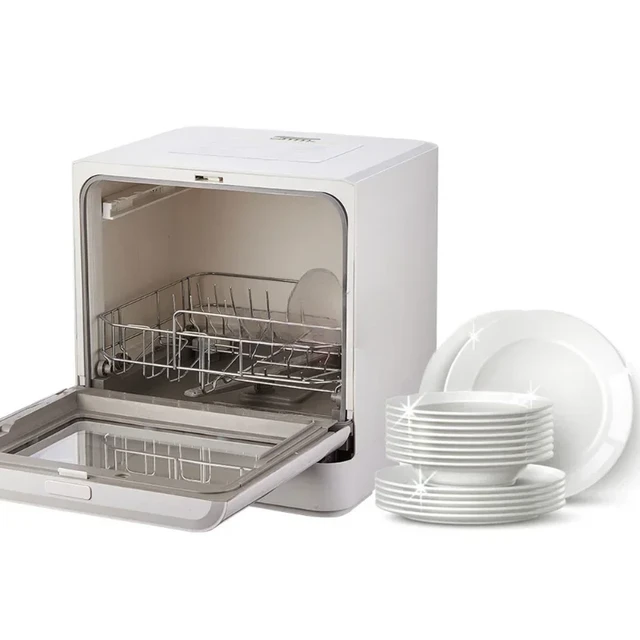Introduction
Delicate dishware, such as fine china, crystal glasses, or hand-painted ceramics, requires special care to ensure it remains in pristine condition. Many people wonder if it is safe to wash delicate dishware in a dishwasher. While handwashing is typically recommended for these items, advancements in dishwasher technology and dishwasher-safe labels on certain delicate dishware have made it possible to clean them in the dishwasher. In this guide, we will explore step-by-step instructions and precautions for safely washing delicate dishware in the dishwasher, ensuring their preservation while enjoying the convenience of automated cleaning.

Can delicate dishware be safely washed in a dishwasher?
Assess Dishwasher Safety
1.1. Check for Dishwasher-Safe Labels
Before placing delicate dishware in the dishwasher, check for dishwasher-safe labels on the items or their packaging. These labels indicate that the dishware has been tested and approved for dishwasher use. If the item lacks a dishwasher-safe label, it is best to err on the side of caution and handwash it.
1.2. Consult the Manufacturer’s Guidelines
If dishwasher-safe labels are absent, consult the manufacturer’s guidelines for specific recommendations regarding dishwasher use. Manufacturers may provide instructions on water temperature limits, cycle types to avoid, or other precautions to protect delicate dishware.
1.3. Consider the Dishware’s Age and Condition
Older or more fragile delicate dishware may be more susceptible to damage during dishwasher use. Consider the age, condition, and sentimental value of the items before deciding whether to wash them in the dishwasher or handwash them instead.
Load Delicate Dishware Carefully
2.1. Separate Delicate Items
To minimize the risk of damage, separate delicate dishware from other items that may cause scratching or chipping. Avoid placing metal utensils or heavy pots and pans in the same dishwasher load.
2.2. Arrange Items Securely
Ensure that delicate dishware is securely positioned in the dishwasher, preventing movement or potential contact with other items during the wash cycle. This can be achieved by placing the items on the top rack or using dishwasher-safe racks or holders designed specifically for delicate dishware.
2.3. Avoid Overcrowding
Allow sufficient space between delicate dishware items to ensure proper water circulation and prevent potential damage from contact. Overcrowding can increase the risk of chipping or breakage during the wash cycle.

Choose the Right Cycle and Settings
3.1. Select a Delicate or Gentle Cycle
Most modern dishwashers offer delicate or gentle cycle options specifically designed for fragile dishware. These cycles use lower water pressure, reduced temperatures, and shorter wash times to minimize the risk of damage.
3.2. Adjust Water Temperature
Set the water temperature to a lower setting, typically around 120°F (49°C), to prevent excessive heat exposure that may damage delicate dishware. Consult the dishwasher’s user manual for instructions on temperature adjustment.
3.3. Disable Heated Drying
Disable the heated drying option in the dishwasher settings or select an air-dry or no-heat drying option. Heated drying can subject delicate dishware to prolonged exposure to high temperatures, increasing the risk of damage.
Use Gentle Dishwasher Detergent
4.1. Choose a Mild Dishwasher Detergent
Opt for a mild dishwasher detergent specifically formulated for delicate dishware. Look for products that are free from harsh chemicals, abrasive elements, or heavy fragrances that may cause damage or leave residue on delicate surfaces.
4.2. Follow the Recommended Dosage
Use the recommended amount of detergent as specified by the manufacturer. Excessive detergent can lead to residue buildup or leave a film on delicate dishware, compromising its appearance.
Precautions for Specific Types of Delicate Dishware
5.1. Fine China
Fine china requires extra care due to its delicate nature. Ensure that each piece is securely positioned to prevent chipping or knocking against other items. Avoid contact with metal utensils that may cause scratches or damage to the delicate surfaces.
5.2. Crystal or Glassware
Crystal or glassware can be susceptible to etching or cloudiness in the dishwasher. To minimize this risk, avoid contact with other glassware or metal items during the wash cycle. Place crystal or glassware securely in the dishwasher to prevent movement and potential breakage.
5.3. Hand-Painted or Decorated Ceramics
Hand-painted or decorated ceramics may be more delicate and prone to fading or chipping. Check the manufacturer’s guidelines for dishwasher use, as some hand-painted items may require handwashing to preserve their intricate designs. If uncertain, it is safer to handwash these items.

Post-Dishwasher Care
6.1. Inspect Items Thoroughly
After the dishwasher cycle is complete, carefully inspect delicate dishware for any signs of damage, residue, or water spots. Address any issues promptly to prevent them from becoming permanent or more difficult to remove.
6.2. Hand Dry if Necessary
If any water spots remain or if delicate dishware still feels slightly wet, consider hand-drying the items using a soft, lint-free cloth. This helps ensure a spot-free finish and prevents water spots from forming.
Handwashing as an Alternative
7.1. Handwash Highly Valuable or Sentimental Items
For highly valuable or sentimentally significant delicate dishware, handwashing is the safest option. Handwashing allows for greater control over the cleaning process, minimizing the risk of damage to these irreplaceable items.
7.2. Follow Handwashing Best Practices
Handwash delicate dishware using a gentle dish soap and warm water. Use a soft sponge or cloth to clean the items, avoiding abrasive materials that may scratch or damage delicate surfaces. Rinse thoroughly and dry with a soft, lint-free cloth.

Addressing Damage or Issues
8.1. Cracks or Chips
If you notice any cracks or chips on delicate dishware after it has been washed in the dishwasher, it is important to address the issue promptly. Cracked or chipped dishware can be more susceptible to further damage or breakage. Consider discontinuing dishwasher use for these items to prevent additional harm and handwash them instead.
8.2. Fading or Discoloration
In some cases, delicate dishware may experience fading or discoloration when washed in the dishwasher. If you notice any changes in color or fading, consult the manufacturer’s guidelines or seek professional advice for potential restoration options. Discontinue dishwasher use for those items to prevent further damage.
8.3. Residue or Water Spots
Residue or water spots may occasionally occur on delicate dishware even when following proper dishwasher techniques. If you encounter residue or water spots, reevaluate the dishwasher detergent used and consider switching to a different brand or formula specifically designed for delicate dishware. Adjusting the dosage or selecting a different cycle or drying option may also help alleviate the issue.

Conclusion
While delicate dishware requires special care, many dishwasher-safe items can be safely washed in the dishwasher. By following the steps outlined in this guide, carefully assessing dishwasher safety, loading items with caution, selecting appropriate cycles and settings, using gentle detergent, and taking specific precautions for each type of dishware, you can enjoy the convenience of automated cleaning while preserving the beauty and integrity of your delicate dishware. However, for highly valuable or sentimental items, handwashing remains the safest option. By combining proper dishwasher use with handwashing when necessary, you can maintain your delicate dishware for years to come.

